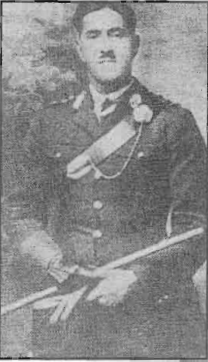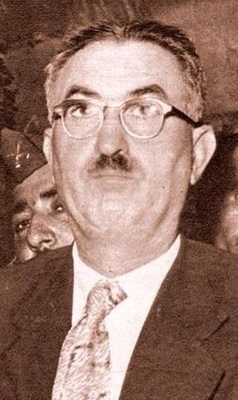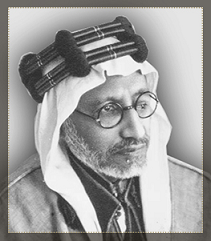Related Research Articles

Rashid Ali al-Gaylani (Al-Gailani) was an Iraqi politician who served as Prime Minister of Iraq on three occasions:from March to November 1933,from March 1940 to February 1941 and from April to May 1941. He is chiefly remembered as an ardent Arab nationalist and Arab fascist who attempted to remove British influence from Iraq by starting a coup against the government in 1941. During his brief tenures as prime minister in 1940 and 1941,he attempted to negotiate settlements with the Axis powers during World War II in order to counter British influence in Iraq.

Taha al-Hashimi was an Iraqi politician and served as Prime Minister of Iraq in 1941.

Jamil Al Midfai was an Iraqi politician. He served as the country's prime minister on five separate occasions.

The 1941 Iraqi coup d'état,also called the Rashid Ali Al-Gaylani coup or the Golden Square coup,was a nationalist coup d'état in Iraq on 1 April 1941 that overthrew the pro-British regime of Regent 'Abd al-Ilah and his Prime Minister Nuri al-Said and installed Rashid Ali al-Gaylani as Prime Minister.

Abd al-Ilah of Hejaz was a cousin and brother-in-law of King Ghazi of the Hashemite Kingdom of Iraq and was regent for his nephew King Faisal II,from 4 April 1939 to 23 May 1953,when Faisal came of age. Abd al-Ilah also held the title of Crown Prince of Iraq from 1943 to 1953.

Abd al-Rahman al-Bazzaz was an Iraqi politician,reformist and writer. He was a pan-Arab nationalist and served as the Dean of Baghdad Law College and later as Prime Minister of Iraq. Al-Bazzaz's main political project was the professionalization of the government through increasing access to civilian expertise. That civic agenda came at the expense of the military. Al-Bazzaz was charged by the Ba'athist-dominated government of participation in activities against the government and he was tortured and imprisoned for fifteen months. Al-Bazzaz was released because of illness in 1970 and moved to London for treatment. He died in Baghdad on 28 June 1973.

The Anglo-Iraqi War was a British-led Allied military campaign during the Second World War against the Kingdom of Iraq,then ruled by Rashid Ali al-Gaylani who had seized power in the 1941 Iraqi coup d'état with assistance from Germany and Italy. The campaign resulted in the downfall of Gaylani's government,the re-occupation of Iraq by the British,and the return to power of the Regent of Iraq,Prince 'Abd al-Ilah,a British ally.

Muhammad Fadhel al-Jamali was an Iraqi politician,statesman,Iraqi foreign affairs minister,and prime minister of Iraq from 1953 to 1954 from al-Kadhimiya,Baghdad. During the 1945 United Nations conference,al-Jamali,as Iraqi Minister of Foreign Affairs,signed the Charter of the United Nations on behalf of his country and continued to represent Iraq several times during United Nations meetings.

The Hashemite Kingdom of Iraq was a state located in the Middle East from 1932 to 1958.
The Party of National Brotherhood or National Brotherhood Party was an Iraqi political party formed in 1930–1931 by Yasin al-Hashimi,Naji al-Suwaydi,and Rashid Ali al-Gaylani. A pan-Arabist and strongly nationalist party,it became associated with opposition to the British Empire. It dominated Iraqi governments from its foundation until the 1936 coup.

Ministry of Foreign Affairs of the Republic of Iraq is a cabinet ministry of Iraq,responsible for conducting foreign relations of the country.

German-Iraqi relations are foreign relations between Germany and Iraq. Iraq has an embassy in Berlin,while Germany maintains an embassy in Baghdad and a consulate general in Erbil.

Established in 1920,the Ministry of Justice of Iraq (MoJ) is the federal government ministry concerned with judicial and prosecutorial training,publishing the Official Gazette,notaries public,deeds and records,and since 5 June 2004,prisons. In 2007,the ministry possessed a staff of 13,619. Also,130 courthouses and headquarters are located at the Ministry of Justice Building.
The Al-Muthanna Club was an influential pan-Arab fascist society established in Baghdad ca. 1935 to 1937 which remained active until May 1941,when the coup d'état of pro-Nazi Rashid Ali al-Gaylani failed. It was named after Al-Muthanna ibn Haritha,an Iraqi Muslim Arab general who led forces that helped to defeat the Persian Sassanids at the Battle of al-Qādisiyyah. Later known as the National Democratic Party,Nadi al-Muthanna was influenced by European fascism and controlled by radical Arab nationalists who,according to 2005's Memories of State,"formed the core of new radicals" for a combined Pan-Arab civilian and military coalition.
Parliamentary elections were held in Iraq in 1925,the first under the 1925 constitution. After the elections,Abdul-Muhsin Al-Saadoun became Prime Minister for the second time and founded the Progress Party to support the government and gain a parliamentary majority.
Parliamentary elections were held in Iraq on 29 April 1939 to elect the members of the Chamber of Deputies.
Ali Mumtaz al-Daftary was an Iraqi nationalist-oriented politician,held several posts in the Kingdom of Iraq,including parliamentary and ministerial positions.
Ali Mahmud al-Shaykh Ali al-Hiazi al-Obeidi is an Iraqi politician,born on June 3,1901,in Abu Ghraib.

Sharif Sharaf bin Rajeh was the regent of the Kingdom of Iraq from April of 1941 to June 1941,as well as a Jordanian senator and the Emir of Taif until his death. He,a distant relative of the previous regent Abdullah,was appointed under Rashid Ali al-Gaylani to legitimize Golden Square control of Iraq.
Musa Mahmoud al-Shabandar was an Iraqi politician who held various positions in Iraqi governments during the Kingdom of Iraq period,including serving as Minister of Foreign Affairs several times between 1941 and 1955. He's also the founder of what would become the Shabandar Coffeehouse.
References
- 1 2 3 Al-Jubouri, Kamil Salman Jassim. The Dictionary of Poets 1-6 - From the Pre-Islamic Era to the Year 2002.
- 1 2 "Wayback Machine". 2019-01-29. Archived from the original on 2019-01-29. Retrieved 2020-10-01.
- ↑ Ghareeb, Edmund A.; Dougherty, Beth (2004-03-18). Historical Dictionary of Iraq. Scarecrow Press. ISBN 978-0-8108-6568-6.
- ↑ "صحيفة التآخي - وزراء المعارف في العراق 1920-1958". 2019-01-29. Archived from the original on 2019-01-29. Retrieved 2020-10-01.